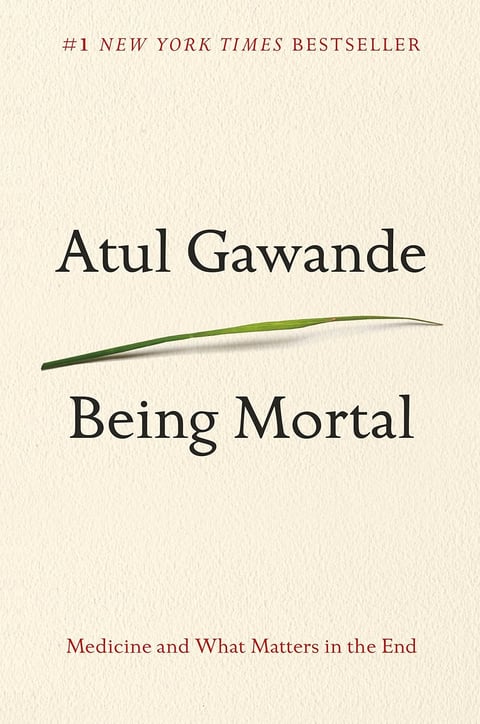Embracing Mortality: A Path to Fulfillment
Explore how embracing mortality can lead to a more fulfilling life. Discover strategies for charting your course towards meaningful living and personal growth with Scrubs & Cents.
NEWESTHEALTH TOPICS FOR EVERYONE


Disclaimer: This article may contain affiliate links. This article is based on personal experience and the opinions of the writer(s). No information in this article may be taken as a substitute for personalized advice from an appropriately licensed healthcare professional.
So maybe not the jump up and down exciting topic to end the year on, but probably one of the most important, if not the most important, anyone will ever face when it comes to their personal healthcare journey. Today, I wanted to refer back to a section of November’s Day of the Dead article about looking forward, even to the end. I know most people rarely want to think about it, but it is a natural part of everyone’s story, and we will all have to face it. However, hopefully, I can impart some nursing insight that will help you feel empowered to tackle the topic and realize that it is worth it.
We Who Are Not Afraid of Death
Two things that struck me early on in my career as a nurse, even as early as nursing school, is that first, we in the healthcare field don’t get the luxury of confronting the concepts of death when we want to or turning our faces and minds away from it. From day one of clinical, we are thrust into a world where we confront the mortality of our patients and sit through lectures on ethics and dying. Second, I quickly realized that almost no doctor or nurse who’d been in the profession for more than a few years actually feared dying. What they (we) really worried about is how to die.
Death has never been a comfortable idea to grapple with. Still, with the extreme advances in medicine and prolongation of life, society had wrongly taken on this ideology that life should be preserved at all costs, “the natural way of things be damned.” Therefore, people looked to healthcare to take over the responsibility of the dying.
However, society has forgotten that nurses and doctors are mainly in the business of fixing what can be fixed. We can sometimes offer good comfort and guidance, but we can not cure the incurable, which is what death is. Nor are we spiritual councilors. And, over and over again, we nurses and doctors saw patients being unloaded into our hospital beds who had no way of staving off death except for us to prolong it in often painful and undignified ways.
Over the years, I’ve talked to countless colleagues, including doctors, nurses, EMTs, Paramedics, nurse aides, etc., whose jobs it is every day to tend to patients who require total care, including bathing, cleaning after incontinence, have breathing tubes, feeding tubes, multiple IV drips, etc. People who would likely never leave the hospital or care facility, or if they left, would likely never have a worthwhile existence, going in and out of hospitals and facilities until they finally passed. And I cannot remember a single healthcare professional who said they would be ok dying this way.
Nearly every one of them seemed to fall into one of two camps; either they wanted to die at home with their loved ones close by after having lived the best life they could, or they’d say something along the lines of, “as soon as I can no longer take care of myself, I’m just going walk into the woods or row into the ocean, and no one will ever find me.”
See, what most healthcare professionals had quickly come to realize in their careers after confronting death regularly wasn’t that death itself was what they truly feared, or even pain. There were plenty of medications and treatments to help with pain and comfort. No, what most of them feared was losing control and dignity over their lives, a loss they saw every day in taking care of their patients. And I find myself in this same boat. Though we have become those who are not afraid of death, we do fear becoming another helpless patient who loses the right to make decisions over our own bodies and lives.
The Benefits of Confront Mortality
Keeping control and dignity over our lives is why I so strongly believe confronting our mortality is so important. It might seem counterintuitive, but by acknowledging our mortality, we can actually live more fully. It's like a paradox: the more we accept our limitations, the more freedom we gain. When we understand that life is finite, we’re more likely to prioritize what truly matters. We're less likely to waste time on trivial pursuits and more inclined to focus on experiences, relationships, and personal growth.
I believe that when we confront our mortality, we also gain an incredible sense of empowerment. I first realized this myself when a young nursing student, out of the blue, asked me if I was afraid to die. I wasn’t expecting the question, and my natural reaction was to chuckle even though I didn’t realize I would react this way.
Initially, the student thought I was a bit off, but I quickly pointed out to them what I’d just discussed above about how we die vs. dying itself and pointed out various patient cases they had just encountered on the floor and as it was incredible watching their eyes light up with a realization. They then pronounced that they had much to think about.
And I’m not the only one who has laughed. I can tell you how much more pleasant and stress-free a feeling it is to be able to laugh with colleagues about our own mortality than to hold it inside trying to anxiously avoid the subject.
The Power of Intentional Living
One resource I want to recommend to you is a book I just finished call “Being Mortal” by Atul Gwande. Gwande himself is a physician, and he writes beautiful examples of his patients' lives and those of some of his family. The book isn't just about preparing for the end; it's about shaping the journey. By thinking about how we want to live our lives, even in our final days, we can make conscious choices that align with our values. This intentional living can bring a sense of purpose and peace. It is also the reason I wrote in the Day of the Dead post how preparing for the end is one of the greatest works we will ever do in our lives, because I believe that our goals for the end influence the choices we make now and shape our life journey along the way.
A Gift for Loved Ones
Also, another benefit of confronting our mortality and living with intention, I don’t think people realize, is what it could mean to the people we cherish. One of the most beautiful aspects of this book is its potential to deepen our connections with loved ones. By discussing our wishes and fears openly, we can alleviate anxiety and ensure that our desires are respected. This can be incredibly comforting, both for ourselves and for those who care about us. Having that peace at the end can be an authentic gift for ourselves and those we leave behind.
Practical Steps to Take
If you are ready to take the next step, there are many good resources and books out there. One need only Google or search on Amazon. I’m only recommending the one book myself right now because I’ve read it, and I found it inspiring. “Being Mortal” has some good discussion questions at the end. However, there is also a workbook that accompanies it and provides practical tools to help you navigate these profound questions. It offers guidance for:
Reflect on your values: What truly matters to you? What kind of life do you want to live?
Plan for the future and Practical Steps: Consider your healthcare preferences and end-of-life wishes.
Enhance relationships: Nurture your connections with loved ones and express your feelings openly.
A Sense of Well-being: How to navigate the emotions and inevitable complicated feelings and thoughts surrounding end-of-life planning.
Also, for those interested but reading a book can seem daunting, there are an audible options. And I know many of you have Kindle Unlimited or Audible plans: the book is free to read with Kindle Unlimited and free to listen to with Audible. I will list the links below:
Embracing Life's Impermanence
In summary, by confronting our mortality, we're not inviting fear but rather embracing a deeper understanding of life. It's about living with intention, gratitude, and a sense of wonder.
So, I encourage you to pick up Being Mortal and its workbook. It's an investment in yourself and your loved ones. By exploring these profound questions, you can unlock a more meaningful and fulfilling life.


